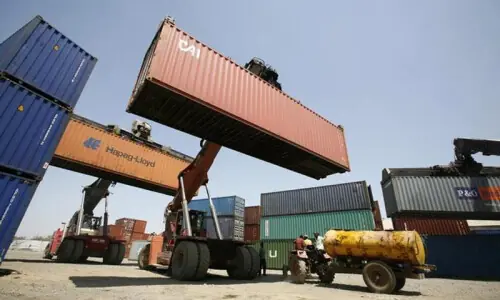ISLAMABAD, April 2: The Competition Commission of Pakistan (CCP) has imposed a major penalty of Rs8.64 billion on Engro Fertiliser Limited (EFL) and the Fauji Fertiliser Company (FFC) for increasing urea prices to an unreasonable level, which led to a rise in food inflation in the country.
The CCP conducted a thorough inquiry into the matter after taking notice of rising trend in urea pries in December 2010.
The order has been conveyed to the two urea manufacturers over their abuse of dominant position in the market.
During the year of inquiry, the urea bag price surged by around 86pc from Rs850 to Rs1,580 and local urea production also increased.
The inquiry included an analysis of factors that could lead to increase in urea prices.
“These factors are gas curtailment – the most important issue as always raised by the urea manufacturers,” said Rahat Kaunain Hassan, CCP chairperson on Tuesday.
The other factors considered by the CCP inquiry committee were input costs, profit margins, subsidies given by the government and other policy issues etc.
“After the inquiry, show-cause notices were issued to all urea manufacturers and many hearings were held so that their point of view could be obtained,” she said, adding, “during the course of hearings, Fauji Fertiliser Company (FFC) acknowledged that the price rise was initiated by Engro Fertilisers Ltd (EFL) and the FFC was only price follower.”
The CCP bench comprised CCP Chairperson and senior member Abdul Ghaffar.
The order noted that urea is an essential item, and the increase in urea prices directly hits food inflation which has gone up by around 45pc in five years. Incidentally the two companies — FFC and the EFL — had obtained Rs77bn subsidies in the past three years from the government to keep the prices at a reasonable level.
In 2011, the Fauji Fertiliser received Rs11bn in terms of subsidy while Engro Fertiliser obtained Rs4.5bn from the government.
The detailed order highlights that despite concerns of gas shortage, the profit of FFC increased from around Rs11bn in 2010 to Rs22.5bn in 2011.
Its return on investment (ROE) after a tax of 97.5pc was above the ROE after tax enjoyed by the undertakings in agro-based economies similar to Pakistan.
The ROE in urea business in India is capped at 12pc, whereas in the case of EFL, the CCP bench referred to a case of excessive pricing in Turkey.
The Turkish authorities had ruled in the case that dropping profits or even loss registered by any company does not imply that it cannot abuse its dominant position.
However, in 2011 the gross profits of EFL went up by more than 80pc from that in 2010. The CCP bench after hearing the urea companies decided to impose a maximum penalty on both EFL and FFC under the Competition Act.
This is 10pc of their individual turnover which comes to Rs3.14bn for EFL and Rs5.5bn for FFC.
The CCP also advised the Securities and Exchange Commission of Pakistan (SECP) that it is critical to conduct forensic cost audit of all urea companies by independent auditors in the interest of transparency.































